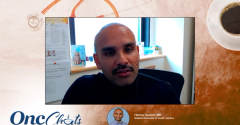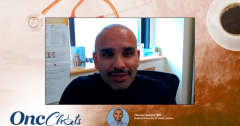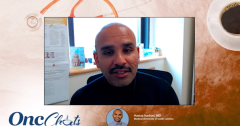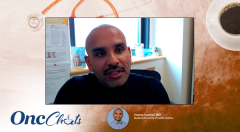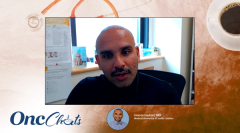
Unpacking Data From Pivotal Trials in Multiple Myeloma: Examining Findings From the GRIFFIN Trial of D-RVd
In this first episode of OncChats: Unpacking Data From Pivotal Trials in Multiple Myeloma, Hamza Hashmi, MD, provides perspective on the use of daratumumab-based quadruplets as induction therapy in multiple myeloma.
Episodes in this series

In this first episode of OncChats: Unpacking Data From Pivotal Trials in Multiple Myeloma, Hamza Hashmi, MD, of the Medical University of South Carolina, provides perspective on the use of daratumumab-based quadruplets as induction therapy in multiple myeloma.
I'm Hamza Hashmi, MD. I am one of the physicians here, at Medical University of South Carolina. I specialize in plasma cell disorders...[and] I'm interested in clinical trials in CAR T-cell therapy and cellular immunotherapy for [these] disorders.
Today, I will be talking about some of the more recent data that have come out of [the 2022] ASCO and ASH Annual Meetings. [I will] discuss some relevant topics and practice-changing studies that have been presented at [those] meetings [and their significance with regard to clinical practice].
First of all, [there was the] GRIFFIN trial [NCT02874742]; 3-year follow-up data [from the maintenance phase of the trial were] recently presented at the [2022] International Myeloma Society meeting. GRIFFIN is a phase 2, randomized trial that looked at patients with transplant-eligible, newly diagnosed multiple myeloma [and compared] the quadruplet regimen of daratumumab [Darzalex], lenalidomide [Revlimid], bortezomib [Velcade], and dexamethasone [D-RVd] vs the triplet of RVd alone.
Patients received induction [treatment for] 4 cycles followed by high-dose melphalan [with] autologous stem cell rescue, followed by 2 cycles of consolidation, followed by 2 years of maintenance [treatment]. We had 3-year follow-up on the maintenance phase that showed that the quadruplet regimen was associated with a better depth and duration of remission, with sustained minimal residual disease [MRD] negativity seen in about 50% of the patients [on the quadruplet arm] vs only 15% of the patients on the triplet arm. That translated into a difference in progression-free survival [PFS], with 90% of the patients in the [investigative arm] progression free at the 3-year follow-up vs about 66% [of those in the control arm] progression free. So, very clearly, [we saw] MRD negativity 10-5 sustained at least 12 months apart, [and this] translated into a difference in PFS outcomes.
D-RVd has now emerged as a new standard-of-care induction [regimen]. Many centers in United States are already [using this combination] for induction [before] transplant [and the quadruplet] is leading to better outcomes. Whether daratumumab needs to be continued for maintenance purposes for a 2-year duration remains to be determined.
There is a phase 3 randomized controlled trial, the CASSIOPEIA trial [NCT02541383], that looked at a combination of daratumumab, bortezomib, thalidomide [Thalomid], and dexamethasone [D-VTd] and compared it with [VTd] alone. [Data showed] that the daratumumab arm, as maintenance, does not lead to any significant benefit in PFS as long as it has been given as induction. I think this is the reason why D-RVd has been incorporated as an induction regimen. Further data [are needed, as the [role of these agents as] maintenance [treatment] remains to be determined.
Check back next Wednesday for the next episode in this series.


